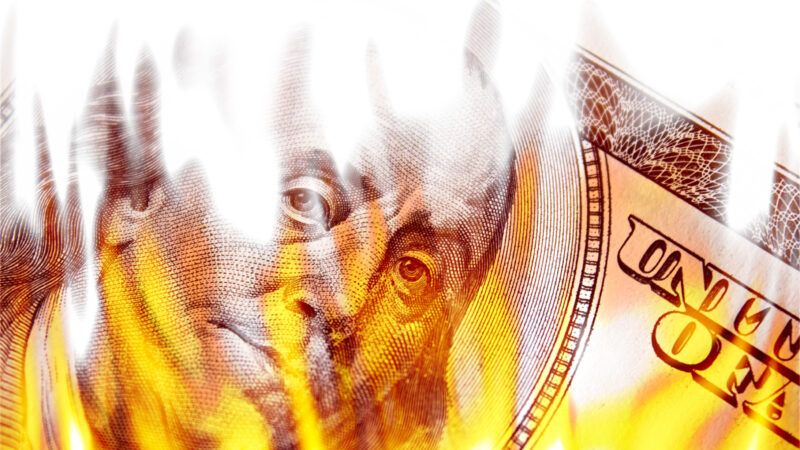Watchdog Report: At Least 20 Percent of Federal Pandemic Unemployment Dollars Wasted
A new report from the Government Accountability Office found that nearly $80 billion was paid out to ineligible beneficiaries or outright fraudsters.

The federal government sent billions in unemployment aid to ineligible beneficiaries and outright fraudsters during the pandemic, according to a new watchdog report. At least $78 billion in jobless benefits, and potentially much more, were misspent during fiscal year 2021, according to a Tuesday report from the Government Accountability Office (GAO).
"Not only is the system falling short in meeting the needs of workers and the broader economy, but the potential for huge financial losses could undermine public confidence in the stewardship of government funds," said GAO head Gene Dorado in a press release yesterday, who called the report's findings "extremely troubling."
The Congressional watchdog agency has rated the unemployment insurance system as "high risk" for waste, fraud, and abuse and called on lawmakers and the administration to undertake immediate reforms.
The federal government's unemployment insurance system—jointly administered by the Department of Labor and a patchwork of state agencies—has long struggled with making improper payments. This problem only got worse during the pandemic, when Congress dumped billions more into an expanded number of unemployment assistance programs.
The GAO found that the improper payment rate jumped from 9 percent in the pre-pandemic fiscal year 2020 to 18.9 percent the next year. That means nearly one in five unemployment insurance dollars went to an ineligible or overpaid beneficiary.
There are multiple reasons for this sharp rise in improper payments.
The GAO reports that some states' legacy 40- and 50-year-old information technology systems used to administer benefits weren't up to the task of identifying potential fraud or overpayments. These same systems also struggled to handle totally new benefit programs covering self-employed workers like rideshare drivers, who typically aren't covered by unemployment insurance.
Federal rules on who was eligible to receive benefits were also "untimely and unclear," according to the GAO report. Some state officials told the agency they'd already set up programs and started sending money out the door by the time Labor Department guidance came down.
The massive increase in available unemployment funds also increased the rate of improper payments. Federal funding for unemployment benefits jumped from $86.9 billion in fiscal year 2020 to $410 billion in fiscal year 2021.
States often struggled to hire enough people to administer these new benefits. The staff they did hire were often undertrained.
The huge increase in unemployment benefits also became a target for fraudsters. The GAO reports that 146 people have pleaded guilty to federal charges of defrauding unemployment systems. In California, for instance, the state paid an estimated $400 million on fraudulent claims made in the name of state prison inmates.
Federal pandemic relief programs typically failed in one of two ways.
Some, like the Paycheck Protection Program for small businesses, prioritized quickly getting money out the door. That resulted in limited vetting of applications, and, consequently, lots of fraud.
Other programs, particularly emergency rental assistance, layered lots of eligibility criteria on the release of funds. That likely prevented fraud and overpayment, but seriously hindered the dispersal of benefits.
The unemployment insurance system's performance during the pandemic shows that these failures aren't mutually exclusive. In addition to overpaying beneficiaries or rewarding fraudulent claims, the GAO found that states also had difficulty efficiently getting money to people who actually qualified for it.
Stories of jobless workers trying to navigate the unemployment insurance bureaucracy or waiting endlessly for benefits were a staple of early pandemic journalism.
We may never get a full accounting of how much unemployment money was misspent. The GAO says that states and the Department of Labor failed to properly track improper payments. The Labor Department's Inspector General estimates that as much as $163 billion in unemployment funds were misspent, the Washington Post reports.
Things don't appear to be getting better either. The GAO report says that the improper payment rate isn't expected to improve for fiscal year 2022
Rent Free is a weekly newsletter from Christian Britschgi on urbanism and the fight for less regulation, more housing, more property rights, and more freedom in America's cities.


Show Comments (22)